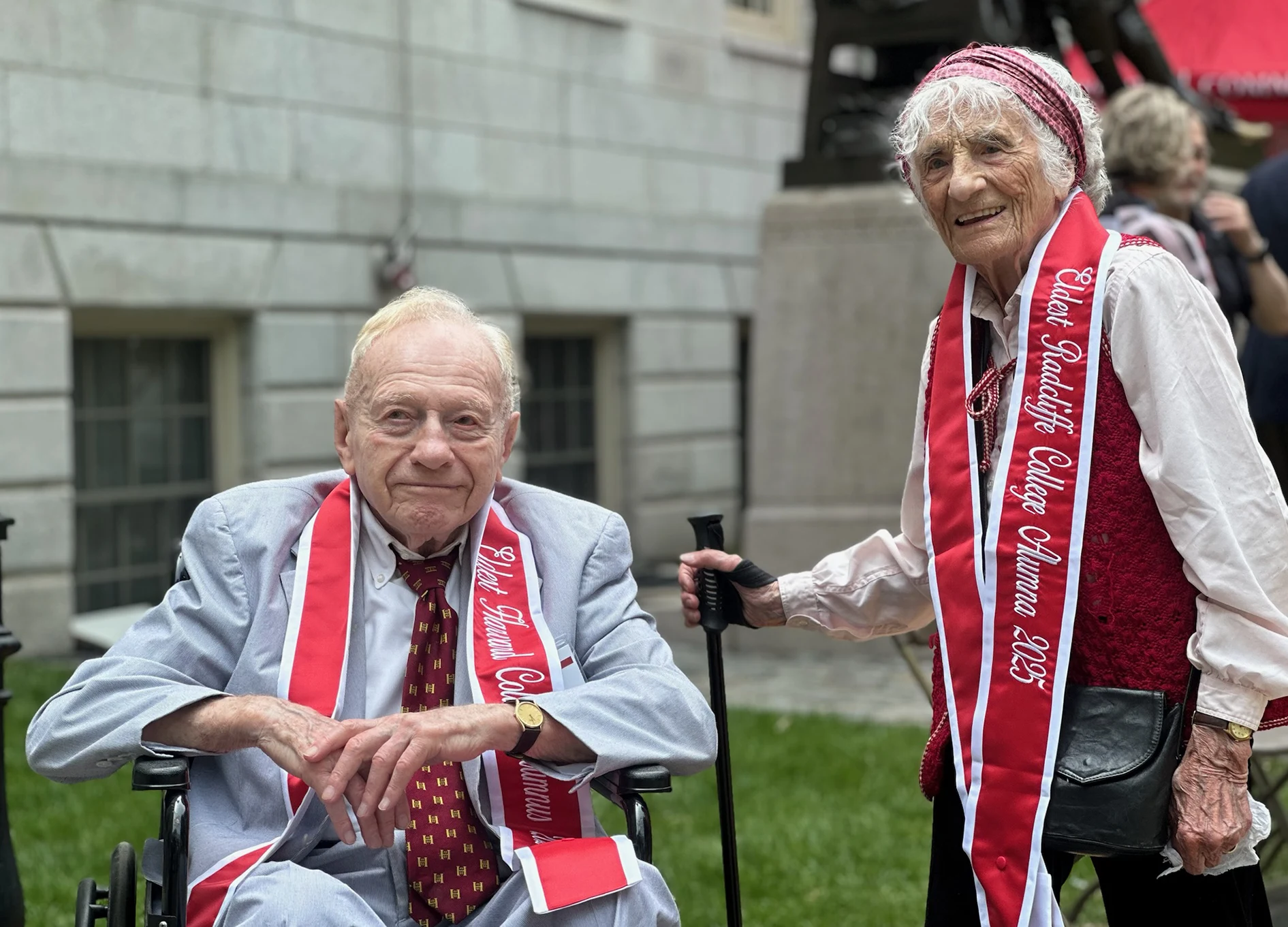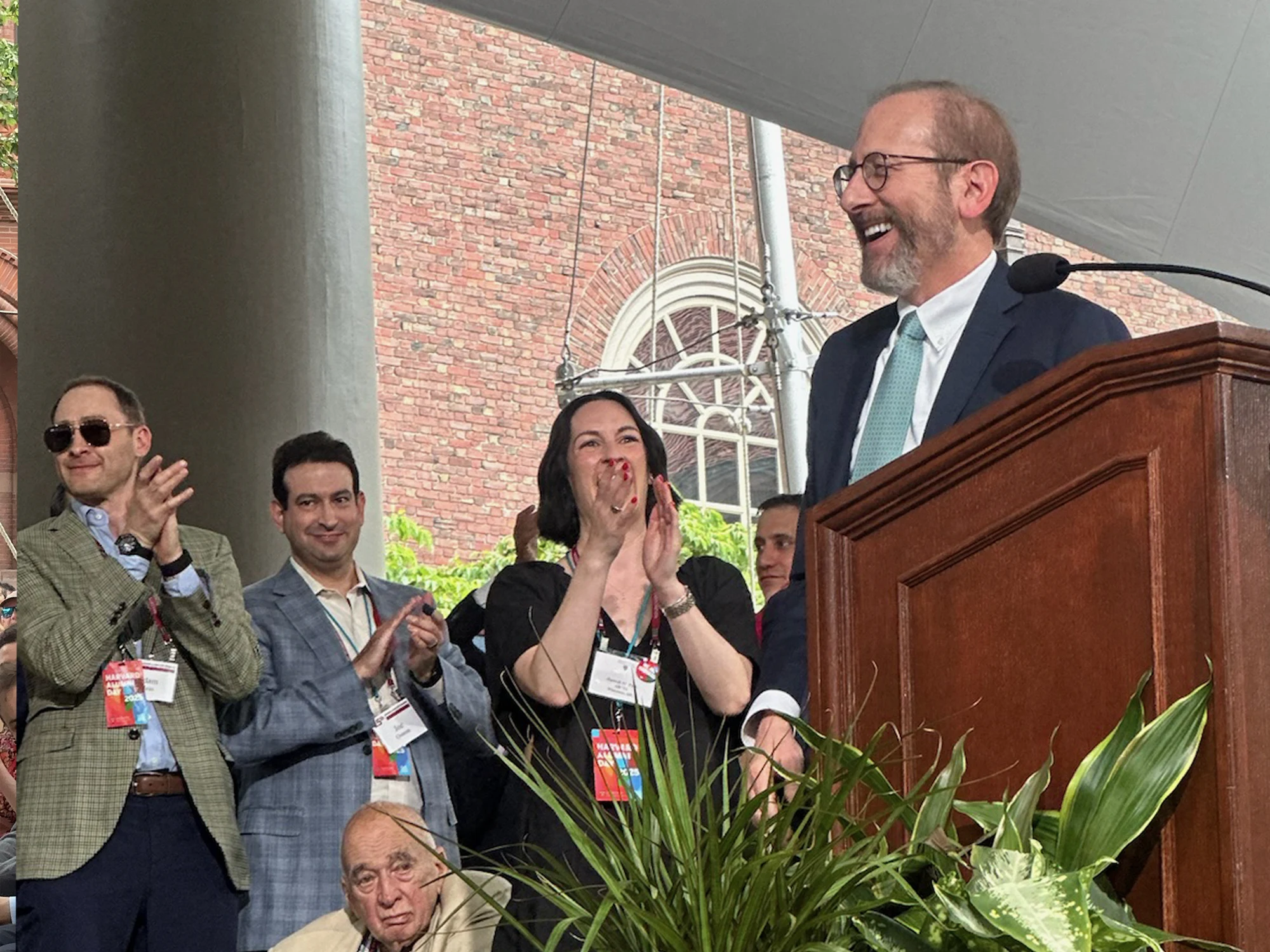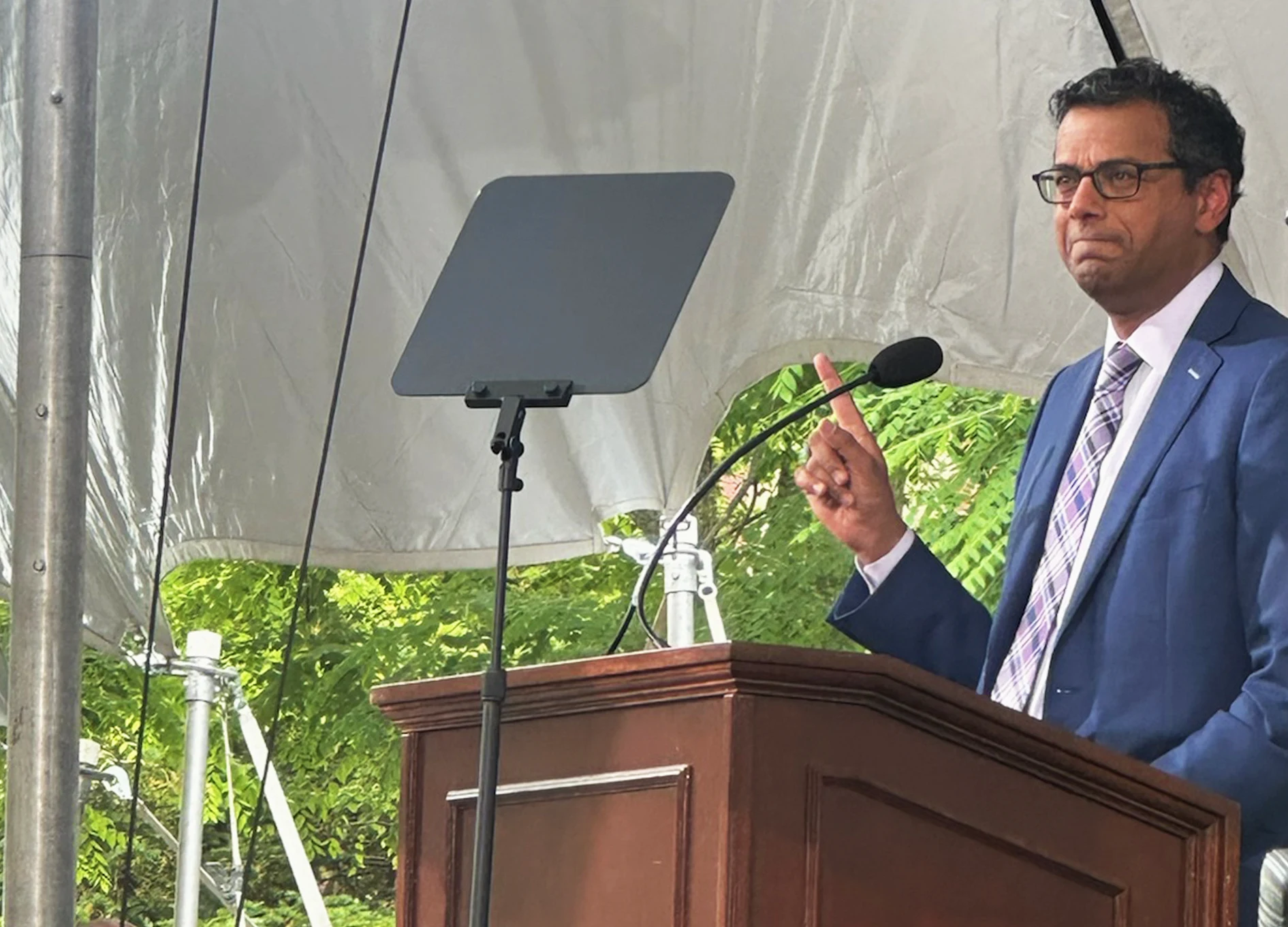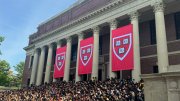The 2025 rendition of Harvard Alumni Day, which brought around 9,000 alumni to Cambridge, felt more like a campaign rally than a reunion. Signs around the yard asked alumni to support Harvard (“Stay Informed. Advocate. Give.”). Alumni donned pins reading “Speaking to power” and “We are Harvard” and stickers reading “Crimson courage.” Three times, attendees stood and cheered for President Alan M. Garber, who has become the face of Harvard’s fight with the federal government. And while President Donald Trump’s name was never mentioned, several speakers directly critiqued his administration—its attacks on foreign students, its stripping of research funding, and its dismantling of the U.S. Agency for International Development (USAID).
The celebration began with the typical revelry. The two eldest alumni in attendance—Linda Black ’51 and Stan Karson ’48, AM ’50, KSG ’50—led the procession (behind a bagpiper). The 155th meeting of the Harvard Alumni Association (HAA) was called to order by HAA president Moitri Chowdhury Savard ’93 (and dramatically commenced by Middlesex County Sheriff Peter Koutoujian, M.P.A. ’03).

After Savard introduced incoming HAA president Will Makris, Ed.M. ’00, Makris tipped his imaginary hat to Garber—one of many small moments of praise. Savard also honored food sustainability expert Dara Olmsted Silverstein ’00, who was elected chief marshal by her class for their 25th reunion. Next, HAA executive director Sarah Karmon honored University volunteers and thanked former HAA director John P. “Jack” Reardon, who will officially retire this year after six decades of service. A collection of choral groups serenaded the crowd with “Radcliffe, Now We Rise to Greet Thee.”
“No institution is without flaws”
A lively round of applause—and chants of his name—greeted Garber as he made his way to the podium. In his annual update to alumni, Garber described the University’s ongoing battle with the federal government, acknowledged legitimate critiques of the institution, and thanked the broad range of alumni and non-alumni who have praised Harvard’s efforts.

Garber laid out three ways the University is responding to its present challenges:
First, we are defending the University against misrepresentations of who we are and what we do.
Second, we are defending the University against retaliation by the federal government for refusing to surrender our rights.
And, third, we are addressing legitimate criticism.
Garber elaborated that “no institution is without flaws.” He continued, “We are working hard to ensure that we give each person at Harvard the opportunity to thrive, which means providing for the safety and security of all members of our community and combating antisemitism and other forms of discrimination and hate.” So too, he said, is the University working on open discourse and viewpoint diversity.
In the nearly two months since Harvard denied the federal government’s demands, alumni have flooded Garber’s inbox with messages of support. But the University’s messaging has resonated with people outside the Harvard community, too.
Our efforts to preserve academic freedom—and our insistence that no government should dictate what we teach, who we admit and hire, and which areas of study and inquiry they can pursue—were welcomed and applauded around the world and across the country—from every state in the Union.
I’ve heard from a monk in Arkansas, a librarian in Kentucky, a firefighter in Massachusetts, a dentist in Oregon, a veteran in Virginia, a social worker in Wisconsin—the list goes on. I’ve heard from high school students and college students, from people who care deeply about higher education and what it represents—and from parents and grandparents whose own hope for the future is bound to the prospects of their children and their grandchildren.
After joking about the glitter attack that interrupted his 2024 Alumni Day address, Garber closed by saying that broad support—from the Harvard community and beyond—will enable “Harvard and our fellow universities to persevere and succeed in building a better future, not perfect but more perfect than the present.”
Following Garber’s speech, violin-toting brothers Danilo “Dacha” Thurber ’25 and Sava Thurber ’27 performed two Polish pieces to illustrate “the importance of an international voice” at Harvard, Dacha said. Garber then honored this year’s four Harvard Medalists, whom the HAA recognized for extraordinary service to the University. The 2025 honorees were Kathy Delaney-Smith, the Ivy League’s winningest basketball coach; Paul J. Finnegan ’75, M.B.A. ’82, who served in numerous leadership roles including University treasurer, chair of the Harvard Management Company, HAA president, Harvard Corporation member, and Overseer; Carolyn Hughes ’54, a prolific undergraduate admissions interviewer; and David Johnston ’63, former governor general of Canada who chaired the Board of Overseers.
“How we endure”
The day’s keynote speaker, physician writer Atul Gawande, M.D. ’95, M.P.H. ’99, condemned the Trump administration’s attacks on public health, research, and higher education, reflected on his surgical experience, and likened Harvard’s—and the nation’s—present battle to a patient enduring a serious disease.

Gawande began by recounting his work leading global health at USAID from January 2022 until January 2025. “It was the best job in medicine you likely had never heard of,” he said. “With less than half the budget of the Mass General Brigham—about $24 per American taxpayer—they saved lives by the millions and contained disease threats all over the world.” But the promising forthcoming treatments supported by USAID (a shot to prevent HIV for a year, three tuberculosis vaccines, and therapies to prevent post-childbirth hemorrhaging) were imperiled by the Trump administration’s “surgery with a chainsaw” that “maximized human suffering, loss of life, and waste of taxpayer dollars.”
When talking to his distressed former colleagues at USAID this year, Gawande reflected on his surgical experience. He recounted an operation he observed while at Harvard Medical School, where the surgical resident removed a college student’s hemorrhaging spleen, saving his life with swift, decisive movements. Gawande was drawn to the visible resolutions of surgery and pursued a career in that field. But chronic and incurable ailments puzzled him.
Curious how to treat patients whose problems could not be quickly addressed, he spoke with more than 200 people with unfixable health problems and wrote Being Mortal. He recalled a conversation with an 89-year-old Floridian, whose health issues led her to move into a nursing home. Though the home was safe and well-reviewed, it did not fulfill the woman’s vision for a meaningful life, which for her included “friendships, purpose to my days, and privacy.”
The questions Gawande asked elderly patients about a meaningful life could be applied to institutions, too. As the White House ramped up attacks on major law firms, Gawande spoke with a friend at a firm that was debating whether to give in to Trump’s demands. Capitulating and resisting both had risks. Gawande’s friend recalled that his clients included “the weak who had stood up to the powerful, victims of illegal government actions, people whom no one else would represent.” Guided by those inspiring cases, his firm chose to resist federal demands.
Now, Harvard is under attack. Last week, Gawande’s research center at Brigham and Women’s Hospital and the Chan School of Public Health lost its funding for the study of surgical mortality reduction. International students may not be allowed to attend Harvard next year. And even Harvard’s accreditation may be at risk. Gawande wondered, what core values should Harvard seek to retain?
So, we here, too, have had to ask ourselves, as a community and as individuals: What are our priorities besides survival? What are we willing and not willing to sacrifice? What is essential to us? Do we brave this existential threat and challenge these vindictive and illegal actions in court or do we try to neutralize the threat by submitting to the administration’s draconian demands?
The discussions have been hard, but the answer was ultimately easy. I want to express gratitude to President Alan Garber and the Corporation, who chose to fight rather than capitulate. Our commitment to tackling serious issues of antisemitism, Islamophobia, and other forms of prejudice must not waver. However, the integrity and independence of this centuries-old institution of teaching, scholarship, and discovery are non-negotiable.
Gawande framed the present moment as a struggle “between a rules-based social order and power-based order.” He expressed his faith that the rules-based order will prevail. “Institutions and nations, like human beings, are perishable. But unlike with human beings, death is not inevitable. They can live on. They are how we endure.”
Update, June 6: An earlier version of this story stated that Gawande’s research center lost its federal funding. Gawande clarifies that Ariadne Labs’ funding for reducing the mortality of surgery was pulled, but some of its other work persists.









